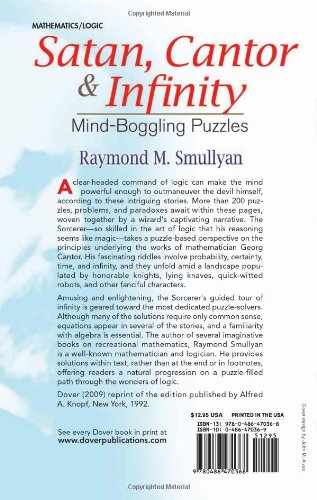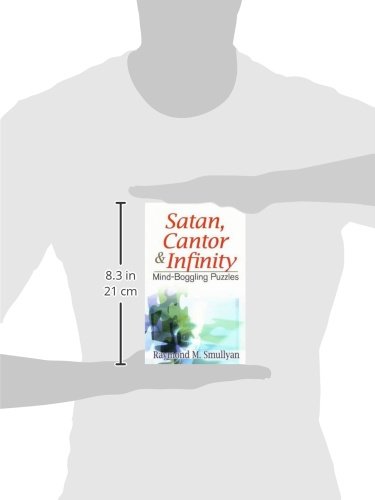



Satan, Cantor and Infinity: Mind-Boggling Puzzles (Dover Math Games & Puzzles)
B**.
Overall fun book of various logic puzzles, despite some flaws
I read a lot of recreational math books and this particular title caught my eye. It's full of various logic puzzles, each group of which introduced and tied together by little narratives and dialogues. Alexander and Annabelle are the two keen puzzle-solver protagonists, and a third protagonist character called the Sorcerer takes them along from one little adventure to another. In each chapter, they're typically taken to a strange land where the inhabitants behave a certain way, and the Sorcerer then gives a number of related logic problems to solve. Or in some cases, if they're not taken to a particular strange land, the Sorcerer will talk about a problem his uncle taught him, or whoever. The solutions to the problems are all provided, usually at the end of the given chapter.For example, remember that old brain teaser where you're at a crossroads and see two people, one who is from a tribe who always tells the truth, the other from a tribe who always lies, but you don't know who's who? And you have to ask the right question that will let you know the correct road to take? Well the author takes that basic premise here (calling the truth-tellers "knights" and the liars "knaves"), and builds upon it to make up about the first half of the book. The book then continues to a number of riddles and other classic brainteasers, such as the "cover a chessboard with dominos" one (for which as another reader pointed out, there's a flaw in the diagram).Part 3 though, "Self-Reproducing Robots" is where the book just horribly jumps the shark. The author just fails to explain this concept clearly like he does for the other chapters. I read and read and read this but just couldn't wrap my head around how to approach these problems to solve them. I'm not dumb; I have two mathematics degrees. It's honestly just a communication failure from the author. Unfortunately he tries to use this concept to build part IV on, as he tries to distill Goedellian problems down to the same language he introduced.Part V is where the fun thankfully resumes. This looks at paradoxes and counter-intuitive problems, like Zeno's paradox. He also talks about the Monty Hall problem, but never, ever mentions it by name. Why, I have no idea. Part VI is about infinity, and he includes classic problems like Hilbert's Hotel, and a teaching of Georg Cantor and how he proved the countable vs. uncountable classes of infinity, and some of infinity's paradoxes. Part VII wraps up with some miscellaneous problems, including a Faustian story of sorts about outwitting Satan in a logic problem. So it's only within these last two parts that we see the book's title come into play.I don't regret buying this book at all, but I really can't give it 5 stars, for the reasons mentioned. I was considering giving it 3 instead of 4. Maybe I'll try to wrap my head around part III again, or find a source that can better explain the same concept, but I haven't found one yet.
S**N
Some of the puzzles are impossible and some are not
I love all of Smullyan's books but this one has a mistake on page 69. In problem 12 he presents a logic problem and the solution claims it is impossible, which it is. But the diagram given in the problem is 8x7 instead of 8x8, making the problem possible. I spent a long time trying to figure that one out!
D**N
another delight by this author
Smullyan is charming, sharp, and consistent. if you try one of his collections and find it engaging,bingo! you have many more opportunities. and you can pass them on.
N**L
Five Stars
Smullyan is always a fun read.
B**Y
Five Stars
I would recommend all of Smullyan
M**E
Five Stars
Great logic!
T**N
A classic reprinted
I read this book many years ago as a checkout book from the library. Loved it! I was hoping for a long time that it would be reprinted. You will enjoy this Smullyan classic.
W**A
This is a must-read!
Smullyan sets up the puzzle situations perfectly, and there actually is a good flow to the plot (although you can decide to hop around the sections without fuss!) I especially enjoyed the section on Gödel's incompleteness proofs... Very enlightening!
Trustpilot
2 months ago
1 month ago